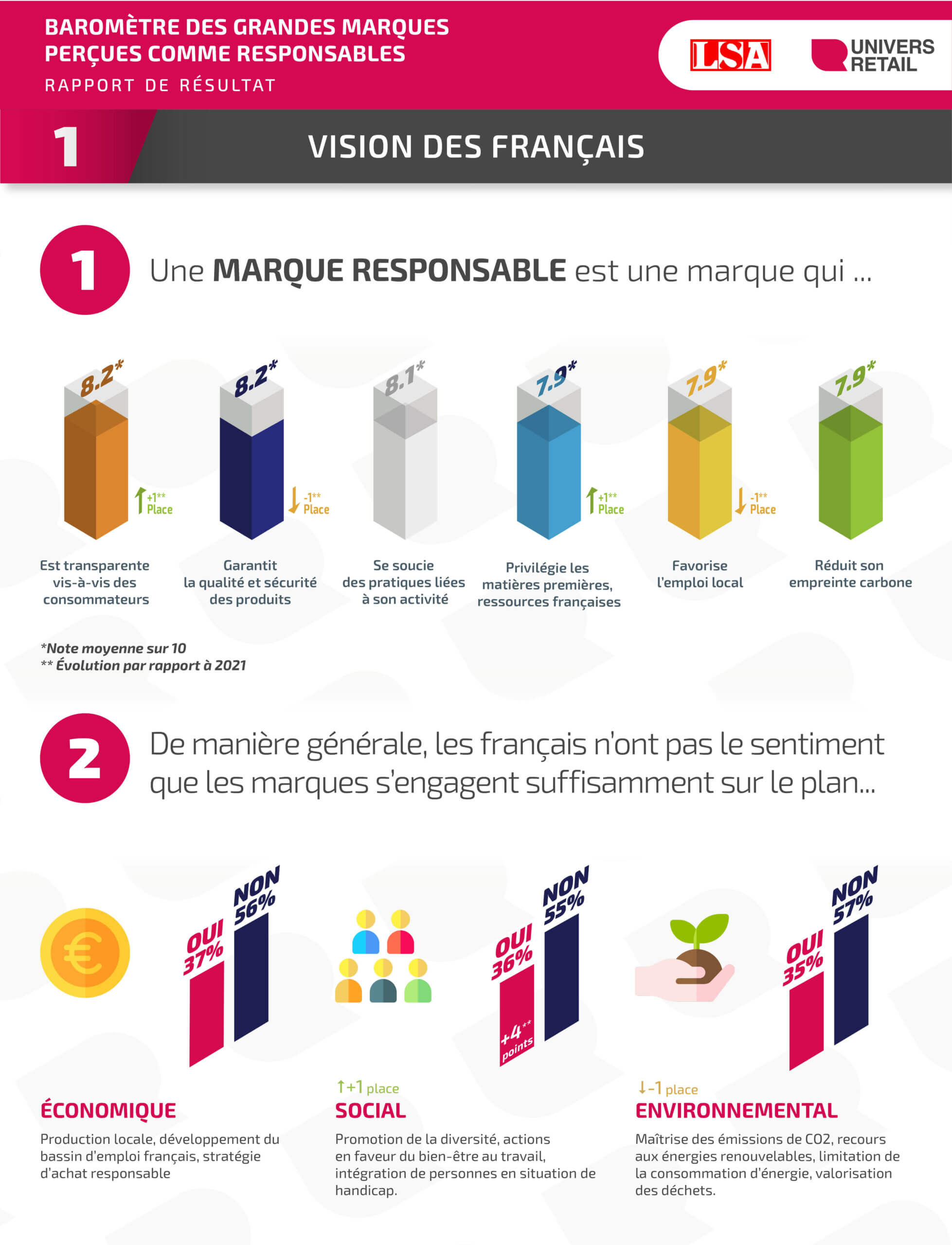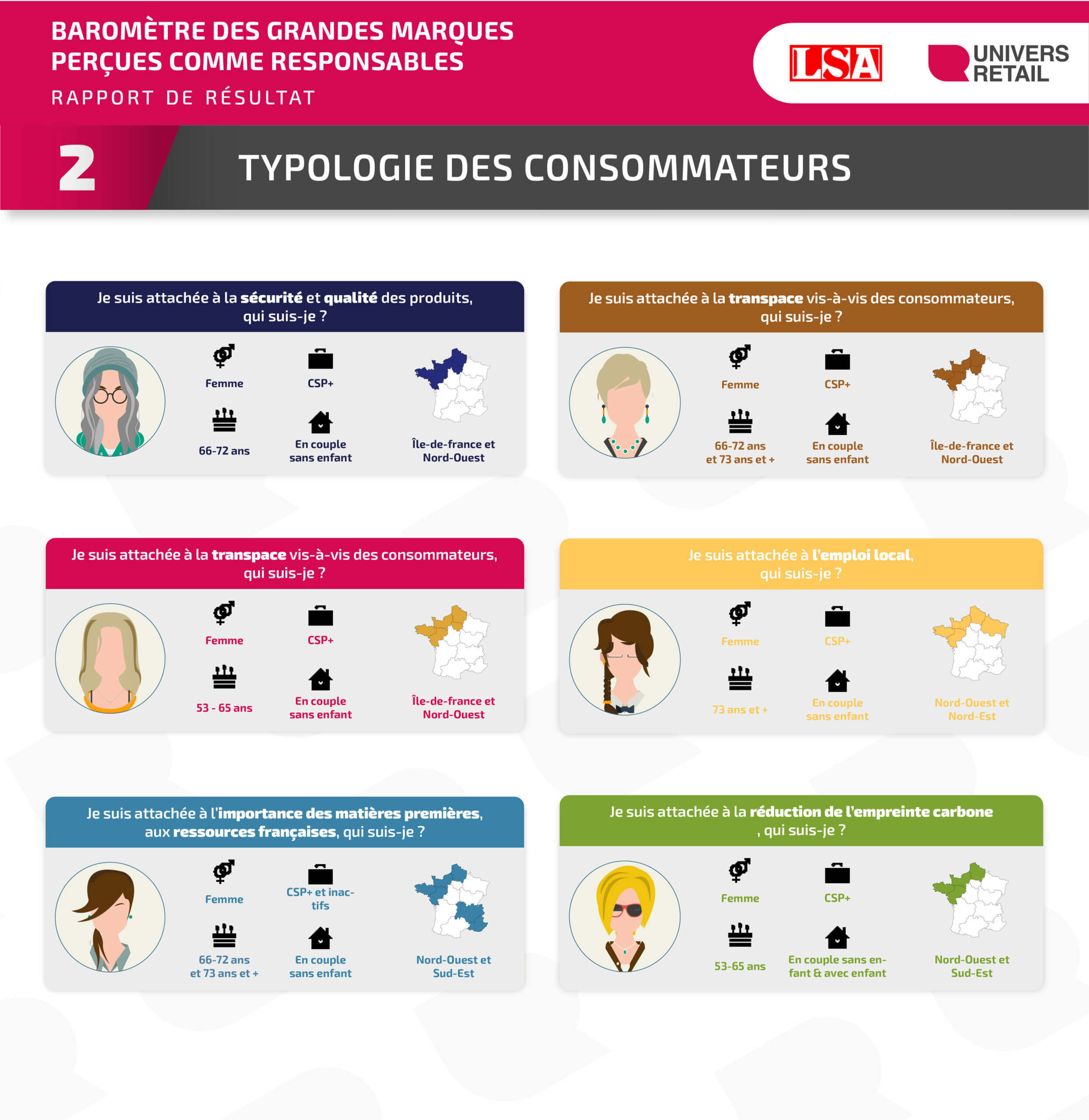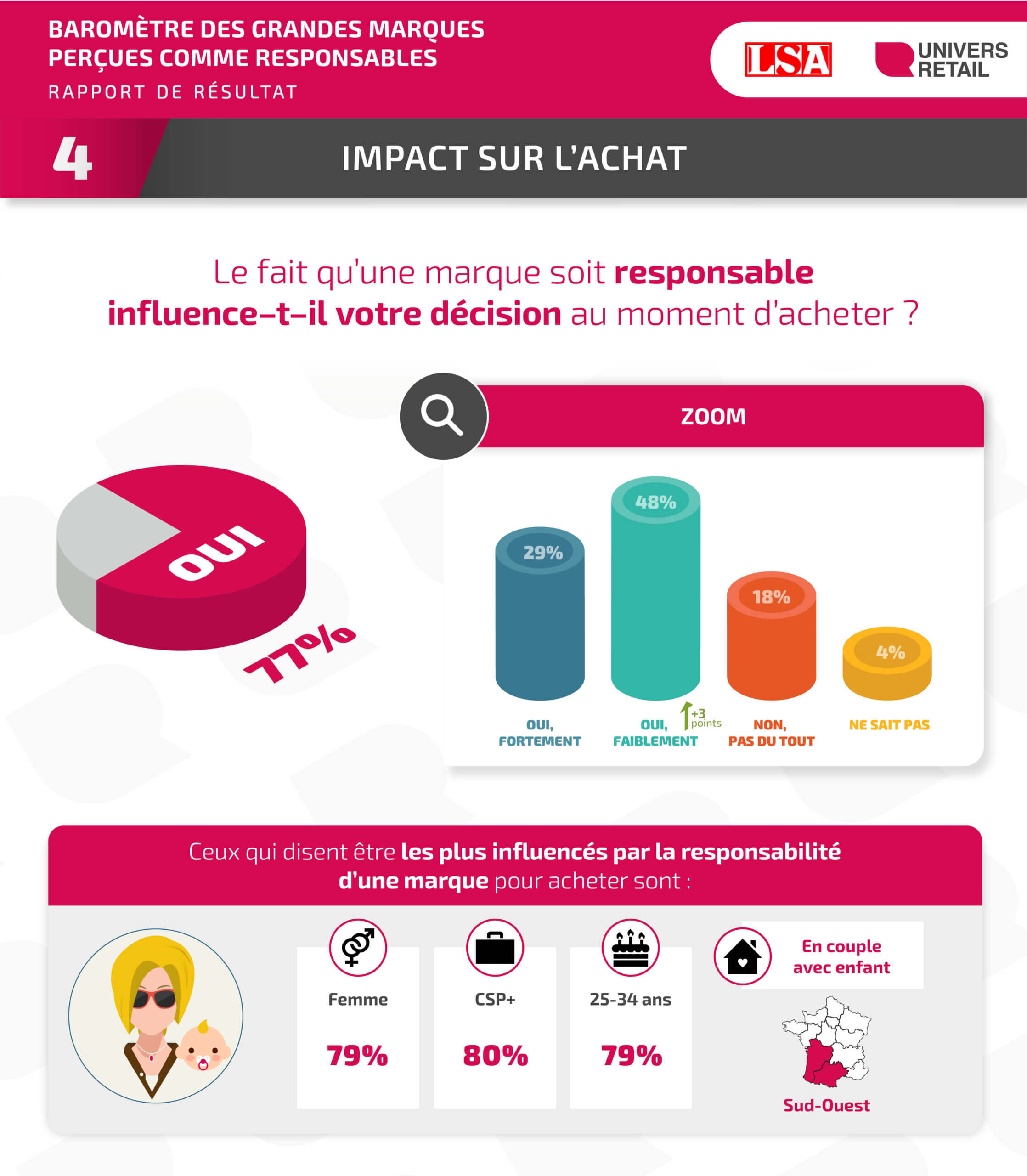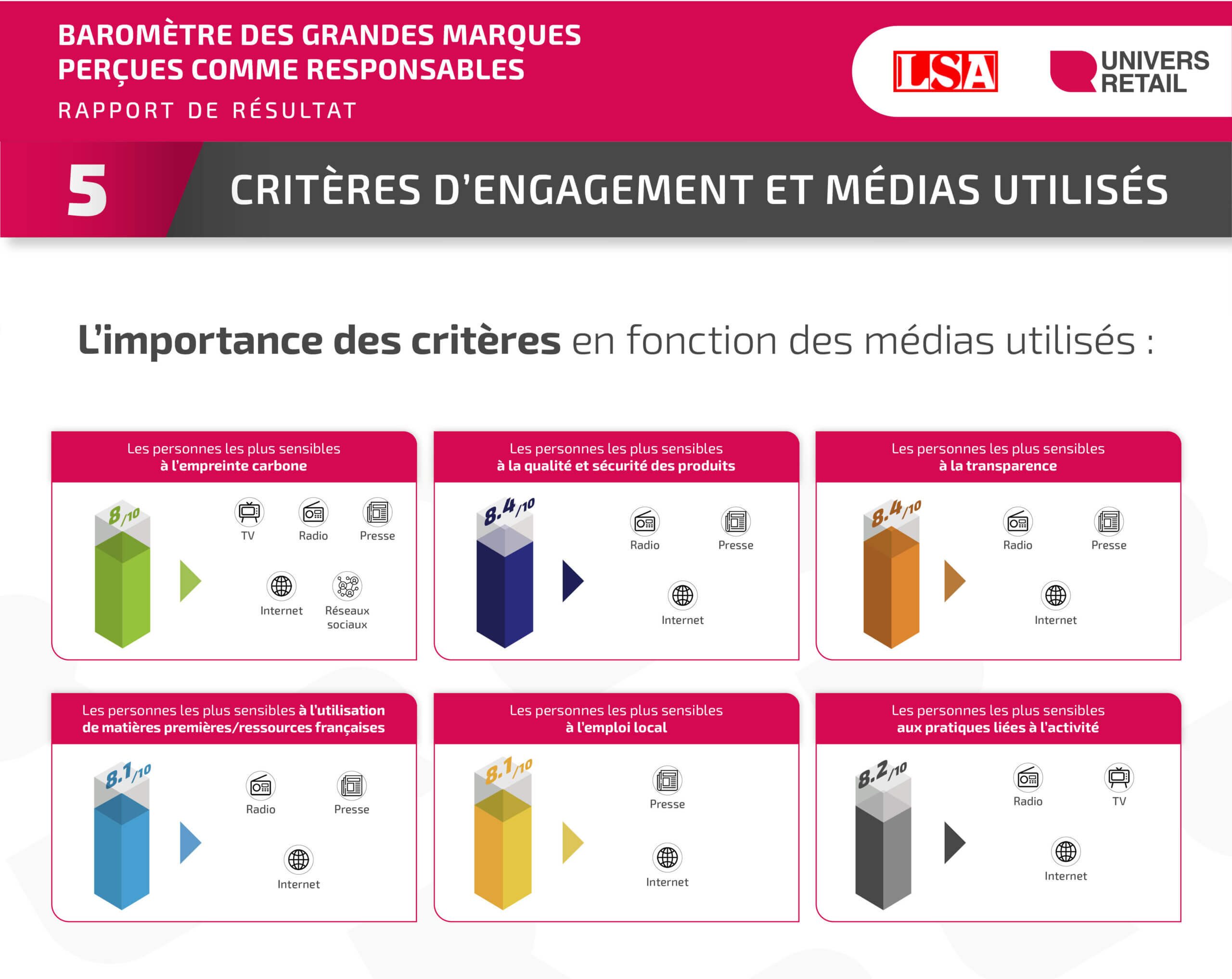Each year, we partner a study with LSAwhich enables us to observe consumer behavior with regard to the responsibility of major brands. This study* is based on a representative sample of 5,000 respondents.
The importance of responsibility is a real issue for brands. Indeed, more and more consumers are influenced in their purchasing decisions by the ethical commitment of brands. It's a point that companies can no longer ignore: a real challenge!
A "responsible" brand is "a concept in which companies integrate social, environmental and economic concerns in their activities and in their interactions with their stakeholders" (source ecologie.gouv).
In this survey, divided into 5 episodes, we look at how this concept influences and impacts French consumers in their purchases.
Being a responsible brand is a term that's being used more and more, responsible in terms of numerous commitment criteria such as: product quality, transparency towards consumers, the environment linked to the activity, ecological impact, carbon footprint and use of raw materials.
In this first episode, find out how the French view and perceive brand commitment from an economic, environmental and social point of view.

Things to remember :
As in 2021, the three most important commitment criteria for the French when it comes to corporate responsibility are: product quality and safety, transparency towards consumers and business practices.
When it comes to French perceptions of economic, social and environmental commitment, one thing is clear: consumers think that brands are not doing enough.
The expert's opinion:
We note a decline in the importance of corporate responsibility criteria. This can be explained by the fact that, by 2022, "75% of consumers express distrust of companies' stated commitments. 67% say it's difficult to distinguish which companies are really committed "* These results show that brands still have some way to go to win the trust of the French.
*Source: Stratégies - Three quarters of French people distrust brand commitments
The question we can now ask ourselves is: "Which type of consumer is most sensitive to which commitment criteria? In this second instalment, discover the characteristics of these profiles and their purchasing habits.

Things to remember :
It's a fact: women, over 53 years of age, living in the Paris region and the South-West of France are the most affected by corporate responsibility, although men remain sensitive to the subject.
The expert's opinion:
Women are generally more sensitive to ethics. Indeed, some studies show that women "tend quite naturally to identify with moral traits such as 'fair', 'honest', 'generous' and 'kind'"*. In the USA, for example, "women are 17% more likely than men to see global warming as 'a serious problem'"**. More sensitive to ethics and ecology, they are also more involved in corporate responsibility.
Source :
* The Conversation - Why women are the true leaders of responsible corporate change
** You Matter - Sustainable development, a girl thing: when saving the world isn't man enough
media. Brands would do well to use the Internet, television, radio and the press to demonstrate their commitment: it's time to demonstrate.
Every brand embodies values of responsibility to a greater or lesser extent in the minds of the French. Whether in terms of their image, their actions or their involvement, companies need to make a significant commitment. It's a real challenge for companies, and the ones you're about to discover have understood this.

Things to remember :
There are three new entries in the top 10 of brands spontaneously mentioned: Lidl, Patagonia and Decathlon , thanks to their numerous efforts in terms of product quality, fair pricing and ecological commitment.
It's no coincidence that the other banners have maintained their positions in the rankings. Take Danone , which has topped the list for the past two years. The company has set up an ecosystem fund to finance the transition to agriculture. In collaboration with Hectar, the world's largest agricultural campus, Danone has developed an organic farm in the Yvelines region.
The expert's opinion:
A closer look reveals a certain contradiction between perceptions and purchasing decisions. Taking Coca-Cola as an example, only 10% of consumers consider the brand to be responsible, yet 1 in 2 French people have bought Coca-Cola in the last 12 months.
On the other hand, across all product categories, 51% consider the Fair Trade brand to be responsible, but only 7% buy Fair Trade products.
This shows that corporate responsibility is not yet fully integrated into purchasing behavior. There's still a long way to go before the notion of responsibility is integrated into purchasing habits.
Corporate responsibility can be a decisive factor in the act of purchasing. The French are increasingly vigilant and keen to consume responsibly. Here we look at the percentage of the population most sensitive to social responsibility, as well as its typology.

Things to remember :
77%: the percentage of people influenced by corporate responsibility. Nearly 8 out of 10 consumers are sensitive to social responsibility. The French, particularly Generation Y, want to consume responsibly, and companies need to evolve with these changing habits. This is a real challenge for brands, which must also be involved economically, socially and ecologically.
The expert's opinion:
The percentage of people influenced by corporate responsibility has dropped by 3% compared to last year (80% in 2021). Remember (CF: Episode 1), 75% of consumers express distrust of companies' stated commitments.
In Episode 2, we noted that people over 53 were the most affected by the criteria linked to corporate commitment. On the other hand, when it comes to the impact on the act of buying, it's the young who are taking the lead and going all the way by buying responsibly(80%).
In this new and final episode, we highlight the importance of the media.
Corporate responsibility criteria will not have the same impact on consumers, depending on the media used.
This data is strategic, as it will enable brands to adapt their communication channels according to the message to reach the consumer's heart.

Things to remember :
As we can see, the press, the Internet and radio are the media most used by those most interested in corporate commitments.
It's worth noting that the more recent social networks are used slightly less by these French people. Nevertheless, their use is increasing year on year. It has risen from 23% to 67% in 11 years*. Keeping an eye on social networks to communicate is therefore essential for retailers.
Source :
The expert's opinion:
This data is a goldmine for brands and their strategy. These figures can be used tooptimize communication campaigns by linking the most favorable media for addressing corporate responsibility.
Take the example of E.Leclerc and its commitment to local employment. The brand respects this strategy. In fact, it was in the press and thanks to the article "des amours de petits producteurs locaux "* that we learned that Leclerc refers nearly 50 small local businesses per store. It's also on its website that we learn more about its "Alliances locales" program, which has set up over 12,000 short circuits in 10 years**.
Sources :
*LSA - Leclerc: "Love" for small local producers!
** E. Leclerc - Local Alliances
* Click here to download the full study.

